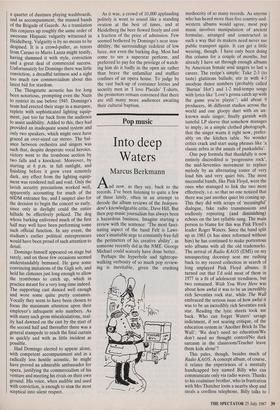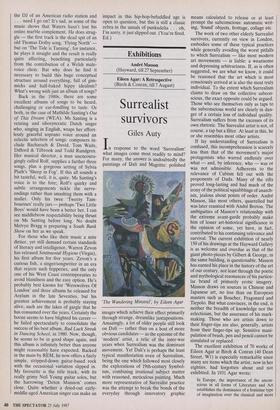Pop music
Into deep Waters
Marcus Berkmann
And now, as they say, back to the records. I've been listening to quite a few of these lately, often in an attempt to decode the album reviews of the Indepen- dent's knowledgeable critic, Dave Hill. But then pop music journalism has always been a hazardous business. Imagine starting a review with the sentence: The most fasci- nating aspect of the band Felt is Lawr- ence's insatiable urge to constantly free-fall the perimeters of his creative ability', as someone recently did in the NME. George Michael could scarcely have done better.
Perhaps the hyperbole and tightrope- walking verbosity of so much pop review- ing is inevitable, given the crushing mediocrity of so many records. As anyone who has heard more than five country-and- western albums would agree, most pop music involves manipulation of ancient formulae, arranged and constructed in such a way that its makers need never use public transport again. It can get a little wearing, though. I have only been doing this column for a couple of months, but already I have sat through enough albums by American female soul singers to last a career. The recipe's simple: Take 2-3 (to taste) glutinous ballads; stir in with 4-5 anodyne dance numbers (probably called `Burnin' Hot') and 1-2 mid-tempo songs with lyrics like 'Love's gonna catch up with the game you're playin"; add about 9 producers, 46 different studios across the world and one gloopy duet with an un- known male singer; finally garnish with tasteful LP sleeve that somehow manages to imply, in a simple clothed photograph, that the singer wants it right now, prefer- ably on the kitchen table. No wonder critics crack and start using phrases like 'a classic zebra in the annals of punkadelia'.
One pop formula that thankfully is now entirely discredited is 'progressive rock', the mid-Seventies movement to replace melody by an alternating roster of very loud bits and very quiet bits. The most successful bands, like Pink Floyd, were the ones who managed to link the two most effectively, i.e. so that no one noticed that there was just another quiet bit coming up. This they did with scraps of 'meaningful' dialogue, fake radio transmissions and endlessly repeating (and diminishing) echoes on the last syllable sung. The main person to blame for this was Pink Floyd's leader Roger Waters. Since the band split up in 1983 (it has since reformed without him) he has continued to make portentous solo albums with all the old trademarks. The arrival of Radio KAOS (EMI) on my unsuspecting doorstep sent me rushing back to my record collection in search of long unplayed Pink Floyd albums. It turned out that I'd sold most of them in 1977 in a fit of adolescent trendiness, but two remained. Wish You Were Here was about how awful it was to be an incredibly rich Seventies rock star, while The Wall embraced the serious issue of how awful it was to be an incredibly rich Seventies rock star. Reading the lyric sheets took me back. Who can forget Waters' savage indictment, if not searing critique, of the education system in 'Another Brick In The Wall': 'We don't need no education/We don't need no thought control/No dark sarcasm in the classroom/Teacher leave them kids alone'?
This pales, though, besides much of Radio KAOS. A concept album, of course, it relates the experiences of a mentally handicapped boy named Billy who can communicate only via radio waves. Thanks to his coalminer brother, who in frustration with Mrs Thatcher loots a nearby shop and steals a cordless telephone, Billy talks to the DJ of an American radio station and . . . need I go on? It's sad, as some of the music shows that Waters hasn't lost his entire marble complement. He does strug- gle — the first track is the dead spit of an old Thomas Dolby song, 'Flying North' but on 'The Tide is Turning', for instance, he plays it straight and the result is really quite affecting, benefiting particularly from the contribution of a Welsh male- voice choir. But why does he find it necessary to build this huge conceptual structure around everything, full of gim- micks and half-baked hippy idealism? What's wrong with just an album of songs?
Back in the 1980s, there are some excellent albums of songs to be heard, challenging or ear-fondling to taste. Or both, in the case of Mathilde Santing's Out of This Dream (WEA). Ms Santing is a retiring and idiosyncratic Dutch singer who, singing in English, wraps her effort- lessly graceful soprano voice around an eclectic selection of songs: composers in- clude Bacharach & David, Tom Waits, Difford & Tilbrook and Todd Rundgren. Her musical director, a man unencoura- gingly called Rolf, supplies a further three songs, plus a gorgeous setting of Sylvia Plath's 'Sheep in Fog'. If this all sounds a bit tasteful, well, it is, quite. Ms Santing's voice is to the fore; Rolf s quirky and subtle arrangements tickle the nerve- endings rather than smashing them with a mallet. Only his twee 'Twenty Tam- bourines' really jars — perhaps 'Two Little Boys' would have been a better bet. I can see middlebrow respectability being thrust on Ms Santing before long. No doubt Melvyn Bragg is preparing a South Bank Show on her as we speak.
For those who like their music a mite dirtier, yet still demand certain standards of literacy and intelligence, Warren Zevon has released Sentimental Hygiene (Virgin), his first album for five years. Zevon's a curious fish, a singer/songwriter in an era that rejects such fripperies, and the only one of his West Coast contemporaries to avoid blandness and the easy option. He's probably best known for 'Werewolves Of London' and three albums he released for Asylum in the late Seventies, but his greatest achievement is probably staying alive, such are the lakes of gargle that he has consumed over the years. Certainly the booze seems to have blighted his career he failed spectacularly to consolidate the success of his best album, Bad Luck Streak in Dancing School, in 1980. Now, though, he seems to be in good shape again, and this album is infinitely better than anyone might reasonably have expected. Backed in the main by REM, he now offers a fairly simple, stripped-down guitar-based rock with the occasional variation slipped in. My favourite is the title track, with its really grimy Neil Young guitar solos, but the harrowing Detox Mansion' comes close. Quite whether a dried-out early- middle-aged American singer can make an impact in this hip-hop-befuddled age is open to question, but this is still a classic zebra in the annals of punkadelia . . . oh, I'm sorry, it just slipped out. (You're fired. Ed.)



















































 Previous page
Previous page